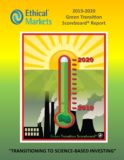Ethical Markets Media Certified B. corporation releases its annual Green Transition Scoreboard for 2019-2020, tracking private green investments since 2009, now a cumulative $10.387 trillion. New capital continues expanding Earth-saving clean energy, green construction, corporate R& D and widening the healthier global plant-protein food sector.
Global Private Green Investments-2019

The report: ‘TRANSITIONING TO SCIENCE-BASED INVESTING: 2019-2020” updates our continual research from scientists on these tectonic shifts affecting mainstream financial markets and their portfolios of “stranded assets” beyond fossilized sectors. We identify a class of hidden financial risks in “science-denial“. These risks lie in disruptive progress of scientific research revealing obsolete processes, externalized costs over-hanging balance-sheets, for example: big polluting, livestock-based meat producers and sellers. Earth systems science-focused research is driving the growth of plant-based food companies offering healthier choices, while reducing livestock’s 15% of climate-changing greenhouse gas (GHG) emissions, waste and pollution of land and water.
While science-denial is driving financial risks, the report indicates that science-based investing is the latest model, with many start-ups headed by scientists. This new model is essential to mainstream finance, beyond conventional anthropocentric models from obsolete economic textbooks. These include financial concepts, formulas still encoded in algorithms driving indexes, ETFs, benchmarks and similar herd-behavior driven financial models of narrow market risks and rewards.
As science continues to lead financial markets into emerging sectors and innovative start-ups, the report expands on its 2018 forecast: “Capturing Co2 While Improving Human Nutrition and Health “finding more investments in thousands of overlooked, nutritious plant foods, including those that thrive on the planet’s 97% saltwater. 40% degraded land without fertilizers or pesticides, eaten in 22 countries, e.g. quinoa, salicornia and China’s salt-tolerant rice. Dr. Hazel Henderson, former US science-policy advisor, CEO of Ethical Markets and lead researcher of these reports says ”Today’s unsustainable food crisis reliant on the planet’s dwindling 3% of freshwater, exacerbating climate change, biodiversity losses, is a case of science-denial. This results in financial risk while causing diet-related human diseases. We cover the science-based investments and startups accelerating the plant food nutrition revolution worldwide.“




